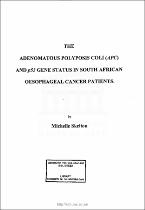| dc.contributor.advisor | Hendricks, Denver | |
| dc.contributor.advisor | Smith, Arlene | |
| dc.contributor.author | Skelton, Michelle | |
| dc.date.accessioned | 2023-06-21T07:27:29Z | |
| dc.date.available | 2023-06-21T07:27:29Z | |
| dc.date.issued | 1996 | |
| dc.identifier.uri | http://hdl.handle.net/11394/10321 | |
| dc.description | >Magister Scientiae - MSc | en_US |
| dc.description.abstract | Oesophageal cancer is the most conmon cause of cancer-related deaths in black males in South Africa. In an effort to understand the molecular nature of oesophageal carcinogenesis in South Africa, two tumour suppressor genes, Adenomatous Polyposis Coli (APC) and p53, were examined in normal and tumour tissue obtained from 33 oesophageal cancer patients. Several studies have shown that alterations of the APC and p53 genes are associated with the development of cancer. Allelic loss at the APC gene locus was examined using two polymorphic markers within the coding region of the APC gene. Single stranded conformation polymorphism, heteroduplex and DNA sequencing analyses were used to detect mutations in the mutation susceptible regions of the APC and p53 genes. The "Mutation Cluster Region" (MCR) in exon 15 of the APC gene was examined. Only exons 5 and 6 in the "hot spot" region of the p53 gene were examined. An allelic loss of 21% (4 of 19 informative cases) and an informativity of 59Yo (19 of 32) of the APC gene was demonstrated in patients analysed. No somatic mutations were detected in the MCR in exon 15 of the APC gene. Three putative mutations were detected in the p53 gene using SSCP and HD analysis, two of which were confirmed by DNA sequencing. Analysis of one patient revealed a TCA to TGA base substitution at codon 183 in exon 5 of the p53 gene, resulting in a stop codon at that position. An eleven base pair deletion in exon 6 of the p5 3 gene was detected in another patient. This deletion caused a frame shift mutation and culminated in a premature stop codon 13 codons downstream. Overall, a mutation frequency of 8% (2 of 25 patients analysed) was detected for the p53 gene with exons 7 and 8 still pending further study. These results suggest that the APC gene may not be involved in oesophageal cancer in South Africa and further studies are necessary in order to examine the role of thep53 gene in this disease in South Africa. | en_US |
| dc.language.iso | en | en_US |
| dc.publisher | University of the Western Cape | en_US |
| dc.subject | Oesophageal cancer | en_US |
| dc.subject | Adenomatous polyposis coli | en_US |
| dc.subject | Development of cancer | en_US |
| dc.subject | Frame shift mutation | en_US |
| dc.subject | Disease in South Africa | en_US |
| dc.title | The adenomatous polyposis coli (APC) and p53 gene status in South African oesophageal cancer patients | en_US |
| dc.rights.holder | University of the Western Cape | en_US |

